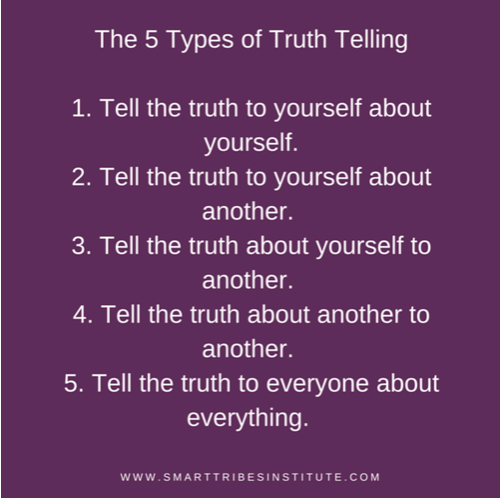How much truth do you tell? The whole truth? The partial truth? The preferred truth?
I’ve been noticing how uncomfortable truth can be for people to hear, and I’m getting really curious as to why we lie so often. When did it become “not ok” to say what was really going on?
When did we start dancing around our needs, our truth, our beliefs?
Did it really make us more safe? Enable us to belong? Enable us to matter?
I read Neale Donald Walsch’s Conversations with God – Part 2 recently and liked the way he laid out the 5 levels of truth telling (you’ll see them below).
If you prefer to listen, you can get the episode on Crack the Behavior Code! Otherwise, read on below!
Take The Truth Challenge
So I invite you to take the Truth Challenge. I think if you spend one week telling only the truth you’ll find it so liberating that you’ll want to do it for another week, and another, and maybe even the rest of your life.
I’ve been experimenting with this and have found it tremendously freeing. First, though, a disclaimer: we don’t tell a truth the intentionally hurts another. So if a friend says “do I look fat in these jeans?” you have a choice. If you think it’s true you can say “Yep, sure do” or you can say “The black pants are far more flattering on you” or “You look awesome in skirts” or whatever will be honest but not crush your pal’s self-image.
Here are some ways you can tell the truth, ranked from easiest to more challenging:
- Tell the truth to yourself about yourself. This is where we really admit what is or isn’t working for us, who we really are, what we really need, what is crushing our soul, what changes we need to make, what we truly believe and are willing to stand up for, even to live and die for. I recently told myself that I need more vacations and down time. I love my work so much that I can overdo it. Then I get tired, crabby, not as much fun to be around. So I told my team. They were jubilant and are now holding me to this truth—even when I try to be superwoman—then they say “that’s not how it’s going to be…” They are honoring my truth. I love it.
- Tell the truth to yourself about another. This is where we cop to who a person really is, what they are and aren’t capable of or comfortable with, where they can and cannot show up for us, whether we feel connected to them or not, whether they have our back or not, you get the idea. I recently re-decided to accept people exactly as they are. I had decided this on August 15, 2005 but I had back-slided (to tell the truth J). Now I’ve recommitted. People get to be who they are, and I get to accept them fully or not hang out with them. Ahh. So much simpler than wishing they would change!
- Tell the truth about yourself to another. This is about being seen, standing in who you are, being ok not being perfect (whatever that means!). I once had a hospice patient that was struggling with letting go and accepting her dying process. This was surprising to me, as she was the wife of a minister and I had assumed she was at peace with her creator and dying. She wasn’t. So I created a subtle opening one day for her to share her experience (she was a very “together” woman who didn’t speak about feelings much). After some talking around the topic she looked me in the eye, and said she had neither peace about how she had lived her life nor about her rapidly approaching death. That’s when everything changed for her. We worked through this together, and when she did die 5 weeks later she was ready. She was grateful, peaceful, complete.
- Tell the truth about another to another. This is where I want to stress kindness and acceptance of another’s humanity (read: blind spots) so we can be both truthful and sensitive. We don’t need to tell a truth that doesn’t add value… this “truth telling” can decline rapidly into gossip. Rather when I realized that I had been expecting a junior team member to take on huge challenges that he wasn’t capable of, that weren’t appropriate for him to take on, that were too risky I simply told his leader this. Previously I had been encouraging his leader to stretch him… but once I really looked at him I saw this was a disservice. He wasn’t ready.
- Tell the truth to everyone about everything. This involves being straightforward, kind, and giving yourself a moment to gather your thoughts before speaking if need be (not entirely popular, especially in the talk-or-be-talked-over cultures). Pausing is a gift to yourself, just like saying “let me think about that and get back to you” is.

What would it be like for you to tell the truth—all 5 types–for a week?
——
Have you ever considered using neuroscience to optimize engagement, performance, recruiting, and retention in your organization?
At SmartTribes Institute, we continually strive to apply cutting edge neuroscience tools and resources to modern day businesses and people. If you’d like a taste, check out our upcoming Culture Camp!


